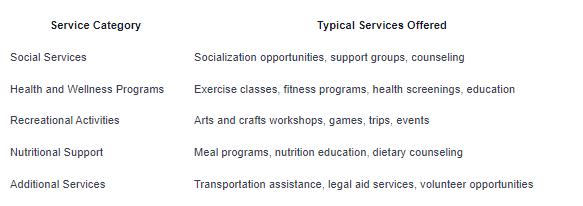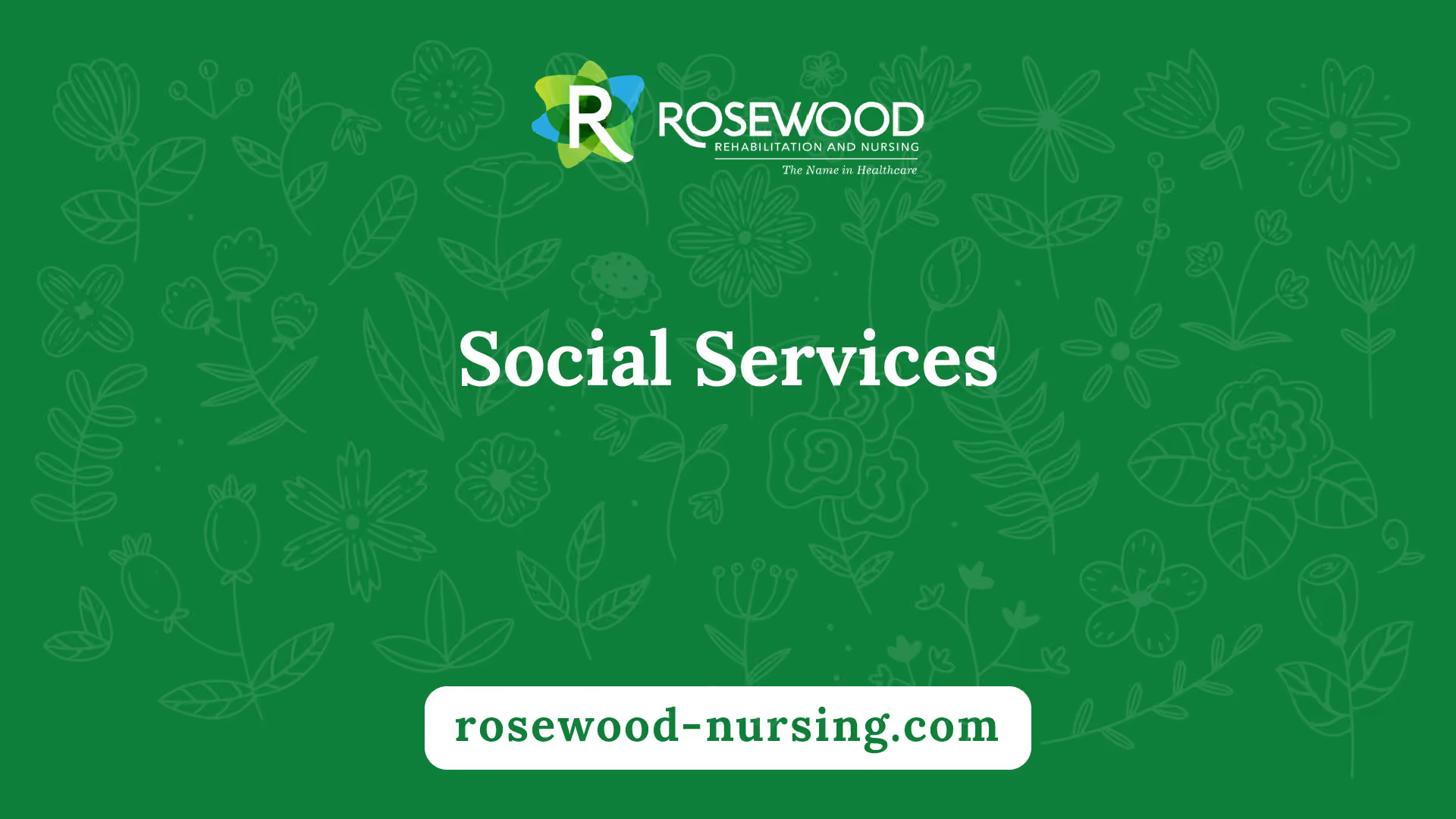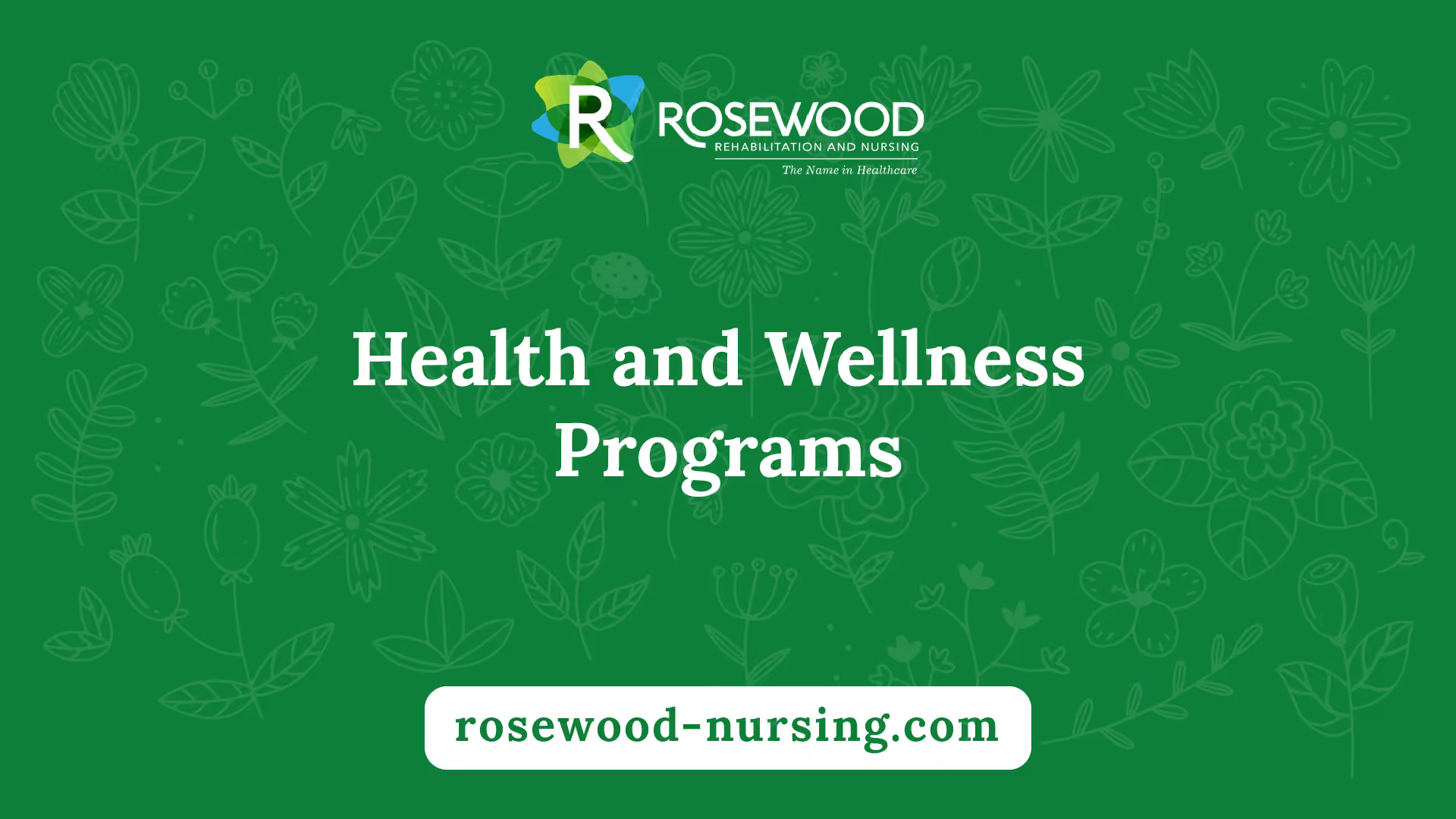What Services Do Senior Centers Provide?
March 4, 2025
Discover the array of services senior centers provide! From social support to health programs, unlock a world of possibilities!

Senior Centers: A Valuable Community Resource
Senior centers play a vital role in enhancing the quality of life for older adults by offering a wide array of services tailored to meet their needs. These centers serve as a hub for social engagement, health and wellness programs, recreational activities, nutritional support, and additional services, all aimed at promoting the well-being of seniors in the community.

The Role of Senior Centers
Senior centers act as a cornerstone of support for older adults, providing a welcoming and inclusive environment where individuals can connect, engage, and thrive. These centers serve as focal points for aging services, offering a multitude of programs and resources to address the diverse needs of senior citizens.
Diversity of Services Offered
Senior centers pride themselves on the diverse range of services and programs they provide to cater to the holistic well-being of older adults. From social services that foster connections and emotional well-being to health and wellness programs that promote physical vitality and preventive care, senior centers offer a comprehensive suite of offerings tailored to meet the unique needs of seniors.
In addition to socialization opportunities, support groups, exercise classes, and health screenings, senior centers also offer a variety of recreational activities, arts and crafts workshops, games, trips, events, meal programs, nutritional education, dietary counseling, transportation assistance, legal aid services, and volunteer opportunities, creating a supportive and enriching community for older adults to thrive.
The table below provides an overview of the different services typically offered by senior centers:

This diversity of services underscores the significance of senior centers as invaluable community resources that cater to the multifaceted needs of older adults, ensuring that they remain active, engaged, and supported in all aspects of their lives.
Social Services
Senior centers play a pivotal role in providing a range of social services that cater to the emotional and mental well-being of older adults. These services focus on fostering social connections, creating a supportive environment, and addressing the unique needs of seniors.

Socialization Opportunities
One of the key services offered by senior centers is socialization opportunities. These programs aim to combat social isolation and loneliness by providing seniors with a space to interact, engage, and build relationships with their peers. Socialization activities may include:
- Group outings
- Community events
- Group dining experiences
Participating in socialization opportunities not only enhances the quality of life for seniors but also promotes a sense of belonging and companionship.
Support Groups and Counseling
In addition to socialization activities, senior centers offer support groups and counseling services to address the emotional and mental health needs of older adults. These services provide a safe and confidential space for seniors to share their experiences, seek guidance, and receive support from trained professionals and peers.
Support groups may focus on various topics such as:
- Grief and loss
- Chronic illness management
- Caregiver support
Counseling sessions may cover areas like stress management, coping strategies, and mental health awareness. By offering these services, senior centers play a vital role in promoting mental well-being and resilience among seniors.
Engaging in social services at senior centers not only enriches the lives of older adults but also contributes to their overall health and happiness. By providing socialization opportunities, support groups, and counseling services, senior centers create a nurturing environment where seniors can thrive and maintain a strong sense of community.
Health and Wellness Programs
Within senior centers, health and wellness programs play a vital role in promoting the overall well-being of older adults. These programs encompass a variety of services aimed at enhancing physical health, mental wellness, and fostering a healthy lifestyle.

Exercise Classes and Fitness Programs
Senior centers often offer a range of exercise classes and fitness programs tailored to meet the diverse needs and interests of older adults. These programs are designed to improve strength, flexibility, balance, and overall physical fitness. Participation in regular exercise classes can help seniors maintain mobility, prevent injuries, and boost their overall quality of life.
Some common exercise classes and fitness programs provided at senior centers include:

Engaging in these exercise classes not only benefits physical health but also promotes social interaction and a sense of community among participants.
Health Screenings and Education
In addition to exercise programs, senior centers offer health screenings and educational sessions to support the overall well-being of older adults. Health screenings help identify potential health issues early, allowing for timely intervention and management. These screenings may include blood pressure checks, cholesterol testing, vision and hearing assessments, and more.
Furthermore, health education sessions provide valuable information on various health topics, empowering seniors to make informed decisions about their health. Topics commonly covered in health education sessions include:

By offering health screenings and educational programs, senior centers play a crucial role in promoting preventive care, empowering seniors to lead healthier lives, and fostering a supportive environment for aging adults to thrive.
Recreational Activities
Senior centers offer a variety of recreational activities to promote social engagement and overall well-being among older adults. These activities cater to different interests and abilities, providing opportunities for seniors to stay active and connected within their community.
Arts and Crafts Workshops
Arts and crafts workshops are popular recreational activities at senior centers, allowing individuals to express their creativity and learn new skills. These workshops offer a therapeutic outlet for seniors to engage in artistic endeavors such as painting, pottery, knitting, and other crafts. Participation in these activities not only fosters self-expression but also promotes cognitive stimulation and emotional well-being.
Games, Trips, and Events
Senior centers organize a range of games, trips, and events to keep older adults entertained and engaged. Games like bingo, card games, and trivia nights provide opportunities for social interaction and friendly competition. Additionally, organized trips to local attractions, museums, and cultural events allow seniors to explore new places and experiences. Special events such as holiday celebrations, talent shows, and themed parties create a sense of community and camaraderie among participants.
These recreational activities not only offer entertainment but also contribute to the mental, emotional, and social enrichment of seniors, enhancing their quality of life and promoting a sense of purpose and belonging within the senior center community. Through arts and crafts workshops, games, trips, and events, senior centers play a vital role in enhancing the overall well-being of older adults and fostering a vibrant and inclusive environment for social engagement and active participation.
Nutritional Support
When it comes to providing essential services for seniors, nutritional support plays a vital role in promoting overall health and well-being. Senior centers offer a range of programs to support older adults in maintaining a balanced diet and making informed nutritional choices. Two key services in this realm include meal programs and nutrition education, as well as dietary counseling.
Meal Programs and Nutrition Education
Senior centers often provide meal programs that offer nutritious and well-balanced meals to participants. These programs not only ensure that seniors have access to healthy food but also create social opportunities for individuals to dine together and engage in meaningful conversations. The meals served are typically designed to meet the dietary needs of older adults, taking into consideration factors such as reduced appetites and specific health conditions.
Moreover, nutrition education sessions are frequently offered at senior centers to help older adults better understand the importance of good nutrition and how to make healthier food choices. These educational sessions cover topics such as meal planning, portion control, reading food labels, and the significance of various nutrients in maintaining optimal health. By equipping seniors with the knowledge and skills to make informed decisions about their diets, these programs empower individuals to lead healthier and more fulfilling lives.
Dietary Counseling
In addition to meal programs and education, senior centers may also provide dietary counseling services to address individual nutritional needs and concerns. Registered dietitians or nutritionists are often available to offer personalized guidance on managing chronic conditions through diet, creating specific meal plans, and addressing dietary restrictions or allergies. These professionals work closely with seniors to develop strategies for maintaining a balanced and nutrient-rich diet that supports their overall health goals.
Nutritional support services at senior centers not only focus on meeting the basic dietary needs of older adults but also aim to foster a greater sense of community, social connection, and overall well-being through shared meals and educational opportunities. By prioritizing nutrition and offering tailored support, senior centers play a crucial role in enhancing the health and quality of life for seniors in the community.
Additional Services
Senior centers play a vital role in providing a wide range of services beyond social and health programs. These additional services cater to the diverse needs of older adults and enhance their overall well-being. Let's explore three key additional services offered by senior centers: transportation assistance, legal aid services, and volunteer opportunities.
Transportation Assistance
One of the essential services provided by senior centers is transportation assistance. Many older adults face challenges with mobility and access to transportation, which can limit their ability to participate in activities outside the home. Senior centers often offer transportation services such as shuttle buses, vans, or coordination with local transit services to ensure that seniors can access the center and other important destinations.
Transportation services not only enable older adults to attend appointments, social gatherings, and recreational activities but also promote independence and community engagement. By providing safe and reliable transportation options, senior centers help seniors maintain their connections with the community and enhance their quality of life.
Legal Aid Services
Senior centers also offer legal aid services to address the legal needs of older adults. Legal issues can arise in various areas such as estate planning, benefits eligibility, housing disputes, and consumer rights. Legal aid services at senior centers may include legal consultations, assistance with paperwork, referrals to legal resources, and educational workshops on relevant legal topics.
Access to legal aid services empowers older adults to navigate complex legal matters more effectively and protect their rights. By seeking guidance from knowledgeable professionals at senior centers, seniors can make informed decisions, resolve legal concerns, and safeguard their interests.
Volunteer Opportunities
Volunteer opportunities are another valuable service provided by senior centers, offering older adults the chance to give back to their communities and stay actively engaged. Volunteering not only benefits the greater community but also provides seniors with a sense of purpose, social connection, and fulfillment.
Senior centers facilitate volunteer opportunities in various capacities, such as assisting with center activities, organizing events, participating in community service projects, or providing companionship to other seniors. Engaging in volunteer work allows older adults to share their skills and experiences, contribute meaningfully to society, and combat feelings of isolation or boredom.
By offering transportation assistance, legal aid services, and volunteer opportunities, senior centers serve as holistic resources that address the diverse needs and interests of older adults. These additional services play a crucial role in promoting social connectedness, supporting legal rights, fostering community involvement, and enhancing the overall well-being of seniors.
Sources
https://www.allaboutseniors.org/what-is-a-senior-center-what-do-they-offer-and-who-can-benefit
https://www.ncoa.org/article/get-the-facts-on-senior-centers/
https://www.webmd.com/healthy-aging/what-to-know-about-senior-centers
Similar articles

How Family Therapy Can Support Recovery Efforts

How to Handle Conflict Resolution in a Nursing Home Setting

The Importance of Nutrition in Short-Term Rehabilitation Recovery

How to Maintain Mobility During Short-Term Rehabilitation

The Benefits of Hydrotherapy in Rehabilitation Programs

What to Know About Specialized Care for Stroke Survivors
How Long-Term Care Facilities Ensure Comfort for Residents with Mobility Challenges
The Role of Continuing Education for Nursing Home Staff
The Role of Preventative Healthcare in Long-Term Care Facilities
How Physical Therapy Supports Recovery in Short-Term Rehab
How to Develop Strength Through Resistance Exercises
How to Improve Flexibility with Physical Therapy
How Family Therapy Can Support Recovery Efforts
How to Handle Conflict Resolution in a Nursing Home Setting
The Importance of Nutrition in Short-Term Rehabilitation Recovery
How to Maintain Mobility During Short-Term Rehabilitation
The Benefits of Hydrotherapy in Rehabilitation Programs
What to Know About Specialized Care for Stroke Survivors
How Nursing Homes Address Dietary Restrictions for Residents
How Long-Term Care Provides Stability and Comfort for Aging Adults
How to Make the Most of Physical Therapy in Short-Term Rehabilitation
How Speech Therapy Can Improve Cognitive and Language Skills in Seniors
How to Plan a Smooth Move to a Nursing Facility
How Nursing Homes Promote Independence Among Residents
How Nursing Homes Adapt to Cultural and Religious Needs
How Long-Term Care Facilities Ensure Safety and Security for Residents
How Long-Term Care Facilities Ensure Safety and Security for Residents
How to Find a Trustworthy Respite Care Provider
How to Encourage Hobbies That Support Recovery
Why Consistency is Key in Rehabilitation Exercises
Creating a Care Plan for Post-Surgical Wound Management
Benefits of Group Therapy in Rehabilitation Facilities
How to Develop a Positive Mindset for Rehabilitation Success
How to Build Confidence After Surgery or Injury
How to Manage Post-Traumatic Stress After an Injury
Managing Chronic Illness with Short-Term Rehabilitation
Creating a Daily Recovery Checklist for Patients
Creating a Daily Recovery Checklist for Patients
How to Use Adaptive Equipment for Daily Living Tasks
How to Regain Hand Strength After Surgery or Injury
How to Improve Communication Skills Through Speech Therapy
How to Adapt Your Home for Safe Mobility After Rehabilitation
How to Improve Posture for Better Recovery Outcomes
How to Create a Safe Sleeping Environment for Recovery
How to Manage Emotional Burnout During Recovery
How to Safely Perform Daily Living Activities After Surgery
How to Prevent Bedsores in Long-Term Rehabilitation
How to Maintain Positive Relationships During Recovery
How to Adapt to Lifestyle Changes After Surgery
Creating a Structured Routine for Rehabilitation Success
Creating a Meal Plan for Post-Rehabilitation Nutrition
How to Encourage Positivity in a Loved One’s Recovery Journey
Tips for Managing Weight During the Rehabilitation Process
How to Cope with Long-Term Pain After Surgery
The Role of Peer Support Groups in Recovery
How to Manage Side Effects of Pain Medications
The Role of Cognitive Behavioral Therapy in Rehabilitation
The Role of Cognitive Behavioral Therapy in Rehabilitation
How to Overcome Isolation During Rehabilitation
How to Manage Chronic Pain Without Medication
Strategies for Enhancing Cognitive Skills During Recovery
The Role of Caregivers in Supporting Rehabilitation Patients
How Art and Music Therapy Enhance Rehabilitation Outcomes
How to Manage Joint Pain in Rehabilitation
How to Avoid Common Setbacks in Short-Term Rehabilitation
How to Handle Stress During the Rehabilitation Process
How to Identify Signs of Depression During Recovery
How to Manage Blood Pressure During Rehabilitation
The Benefits of Holistic Approaches in Rehabilitation
How to Help Seniors Transition from Rehabilitation to Home
Coping with Muscle Stiffness During Rehabilitation
How to Strengthen Weak Muscles After Surgery
How to Manage Fatigue During Physical Therapy
How to Build Core Strength in Rehabilitation
How to Develop Coping Strategies for Physical Limitations
How to Develop a Meditation Routine for Stress Relief
How to Develop Better Sleeping Habits During Recovery
Creating a Positive Mindset for Recovery
The Role of Recreational Therapy in Rehabilitation Centers
Managing Depression During Short-Term Rehabilitation
Coping with Limited Mobility During Short-Term Rehabilitation
How to Build a Strong Support System During Rehabilitation
The Benefits of Music Therapy in Rehabilitation
How to Develop Patience During the Recovery Process
How to Manage Energy Levels During Recovery
The Importance of Goal Setting in Rehabilitation
How to Build Emotional Resilience During Recovery
The Role of Acupuncture in Rehabilitation Care
How to Stay Connected with Friends During Recovery
The Role of Chiropractic Care in Rehabilitation
How to Develop Fine Motor Skills During Recovery
How to Develop Time Management Skills in Recovery
The Role of Skilled Nursing in Long-Term Care
The Benefits of Life Story Work for Seniors in Long-Term Care
How Nursing Homes Support Seniors After Surgery
The Role of Preventive Care in Long-Term Care Facilities
The Benefits of Skilled Nursing Facilities for Seniors
The Benefits of Occupational Therapy for Seniors in Long-Term Care
How to Choose the Right Short-Term Rehabilitation Facility
How to Create a Comfortable Therapy Environment for Seniors
How to Plan for Future Long-Term Care Needs
How Short-Term Rehab Can Improve Quality of Life for Seniors
The Role of Occupational Therapy in Short-Term Rehabilitation
How to Advocate for Your Loved One in a Nursing Home
How Nursing Homes Coordinate with Hospitals for Seamless Care
The Advantages of Short-Term Rehabilitation in Nursing Homes
How Physical Therapy Enhances Mobility in Long-Term Care Residents
The Importance of Specialized Care for Chronic Conditions
How Recreational Therapy Supports Emotional Well-Being in Long-Term Care
Understanding the Different Therapies Offered in Short-Term Rehabilitation
The Role of Peer Support Groups in Senior Care Facilities
The Connection Between Mental Health and Senior Care
The Importance of Consistency in Therapy for Long-Term Care Residents
What to Expect During a Nursing Home Admission Process
What to Expect from a Respite Care Stay in a Skilled Nursing Facility
How to Maximize the Benefits of Short-Term Rehabilitation Therapy
The Benefits of Short-Term Respite Care for Seniors
The Role of Care Coordination in Managing Multiple Therapies
How to Identify the Best Short-Term Rehabilitation Facility for Your Needs
The Role of Advanced Medical Services in Short-Term Rehabilitation
The Difference Between Outpatient and Inpatient Short-Term Rehabilitation
Top Questions to Ask When Touring a Nursing Facility
How Nursing Homes Manage Chronic Pain for Seniors
The Importance of Hydration in Senior Care
The Importance of Personalized Care Plans in Respite Care
How to Transition from Hospital to Short-Term Rehabilitation Seamlessly
How to Know When a Loved One Needs Respite Care Services
How to Ensure Continuity of Care in a Long-Term Care Setting
The Benefits of On-Site Specialists in Long-Term Care Facilities
The Benefits of On-Site Specialists in Long-Term Care Facilities
How to Prevent Rehospitalization After a Short-Term Rehab Stay
The Role of Physicians in a Long-Term Care Setting
How Aqua Therapy Benefits Seniors in Rehabilitation and Long-Term Care
The Importance of Nutrition in Short-Term Rehabilitation
How Short-Term Rehabilitation Prepares Patients for a Safe Return Home
How Personalized Care Plans Enhance Medical Services in Long-Term Care
The Importance of 24/7 Nursing Care in Long-Term Care Facilities
The Importance of Palliative Care in Long-Term Care Facilities
The Benefits of Professional Nursing Support in Respite Care
How to Support a Loved One in Short-Term Rehabilitation
How Respite Care Can Help Families Navigate Caregiver Fatigue
How to Prepare for a Short-Term Rehabilitation Stay
How Therapy Supports Aging Adults with Neurological Disorders
How Short-Term Rehabilitation Supports Recovery After Joint Replacement
How Short-Term Rehabilitation Supports Recovery After Joint Replacement
How Respite Care Supports Family Caregivers and Their Loved Ones
How Long-Term Care Facilities Provide Individualized Therapy Plans
How Family Involvement Supports Short-Term Rehabilitation Success
The Benefits of Having Access to Medical Services During Respite Care
How Skilled Nursing Supports Recovery in Short-Term Rehab
How Therapy Encourages a Faster Return to Daily Activities After Injury
What to Expect from Medical Services in a Skilled Nursing Facility
The Importance of Occupational Therapy in Daily Living Activities for Seniors
How Pain Management Enhances Recovery in Short-Term Rehab
How Sensory Stimulation Therapy Supports Seniors with Dementia
How Speech Therapy Supports Communication and Swallowing in Long-Term Care
The Benefits of Short-Term Respite Care for Seniors and Families
How to Maximize Progress During a Short-Term Rehabilitation Stay
The Connection Between Physical and Mental Health in Long-Term Care Therapies
How Pain Management Therapy Enhances Comfort for Long-Term Care Residents
How to Advocate for High-Quality Medical Services in Long-Term Care
How Respiratory Therapy Helps Manage Breathing Conditions in Long-Term Care
Common Conditions Treated in Short-Term Rehabilitation Programs
The Benefits of Short-Term Rehabilitation for Seniors
How to Incorporate Therapy into Daily Life in a Long-Term Care Facility
How to Choose the Right Therapy Program for a Senior’s Needs
The Importance of Personalized Care in Short-Term Rehabilitation
What to Do if You Suspect Neglect in a Nursing Home
How Nursing Homes Offer Support for Grieving Families
How Nursing Homes Utilize Telemedicine for Resident Care
How Alternative Therapies Support Wellness in Long-Term Care Facilities
How Nursing Homes Support Seniors with Respiratory Conditions
How Nursing Homes Promote Mental Wellness for Seniors
The Benefits of Regular Family Visits for Nursing Home Residents
How to Recognize the Signs That a Loved One Needs Long-Term Care
How Mental Health Support Helps in Short-Term Rehabilitation
How Nursing Homes Provide Emergency Medical Services
How Nursing Homes Provide Support for Parkinson’s Patients
Tips for Communicating Effectively with Nursing Home Staff
How to Choose the Right Nursing Home for Your Loved One
The Importance of Social Activities in Senior Care Homes
Why Family Involvement Matters in Long-Term Senior Care
Tips for Helping Seniors Adjust to Life in a Nursing Facility
The Role of Speech Therapy in Treating Swallowing Disorders
How Nursing Homes Handle End-of-Life Care with Dignity
How to Maintain Progress After Completing Short-Term Rehabilitation
How to Identify Warning Signs of Illness in Elderly Residents
How to Identify Warning Signs of Illness in Elderly Residents
How Personalized Therapy Plans Enhance Short-Term Rehabilitation
The Importance of Mental Health Services in Long-Term Care
How Short-Term Rehabilitation Supports Recovery from Orthopedic Injuries
The Importance of a Support Network in Short-Term Rehabilitation
How to Handle Emotional Challenges During Short-Term Rehabilitation
Why Short-Term Rehabilitation is a Stepping Stone to Long-Term Care
How to Stay Engaged and Active in a Long-Term Care Setting
The Role of Dietitians in Short-Term Rehabilitation
The Role of Recreational Therapy in Short-Term Rehabilitation
How Personalized Care Enhances Recovery in Short-Term Rehab
How to Avoid Complications During Short-Term Rehabilitation
The Benefits of Group Therapy in Short-Term Rehabilitation
The Benefits of Short-Term Rehabilitation for Faster Recovery
The Role of Hospice Care in Long-Term Care Facilities
The Role of Physical Therapy in Long-Term Care for Maintaining Mobility
How to Transition from Short-Term Rehabilitation to Home Care
How Physical Therapy Improves Strength and Mobility in Short-Term Rehab
How Short-Term Rehab Helps Prevent Hospital Readmissions
How Respite Care Helps Seniors Transition to Long-Term Care
How Caregivers Can Support a Patient’s Short-Term Rehabilitation Journey
The Benefits of Palliative Care in Long-Term Care Facilities
How Personalized Care Plans Improve Short-Term Rehabilitation Outcomes
How Long-Term Care Facilities Support Family Involvement
Understanding Memory Care Services in Long-Term Care
How Short-Term Rehabilitation Prepares Patients for Independent Living
How Support Groups Help Families Navigate Long-Term Care Decisions
Why Short-Term Rehabilitation is Essential After Joint Replacement Surgery
The Role of Nutrition in Long-Term Care for Healthy Aging
Managing Pain Effectively in Short-Term Rehabilitation
How to Plan Financially for Long-Term Care Services
How Social Activities Improve Mental Well-Being in Long-Term Care
How Personalized Long-Term Care Plans Improve Quality of Life
What to Expect During a Short-Term Rehabilitation Stay
Speech Therapy in Short-Term Rehabilitation: Why It Matters
The Role of Medical Supervision in Respite Care Programs
How Short-Term Rehab Helps Patients Transition Back Home Successfully
The Role of Therapy Dogs in Short-Term Rehabilitation Recovery
How to Manage Medications During Short-Term Rehabilitation
How Short-Term Rehab Helps Patients Regain Independence
How Medical Services Support Chronic Disease Management in Long-Term Care
The Importance of Advance Directives in Long-Term Care
The Role of Therapy Dogs in Nursing Homes
How Nursing Homes Address Sleep Challenges in Seniors
Nutrition and Dining Services in Nursing Homes
How Nursing Homes Enhance Residents’ Quality of Life
The Impact of Cognitive Therapy on Residents with Dementia
The Importance of Infection Control in Senior Care Facilities
How Nursing Homes Support Families of Residents
The Benefits of 24/7 On-Site Medical Care in Nursing Homes
How to Transition Between Skilled Nursing and Home Care
How Nursing Facilities Ensure the Safety of Residents with Mobility Issues
Myths About Nursing Homes: What Families Need to Know
Signs It’s Time to Transition to a Nursing Home
How Nursing Facilities Incorporate Technology into Therapy Programs
How to Build Strong Relationships with Nursing Home Staff
The Benefits of Intergenerational Programs in Senior Care
How Nursing Homes Manage Pain for Their Residents
How to Encourage Social Interaction Among Seniors in Care
The Role of Volunteer Programs in Nursing Facilities
The Role of Physical Therapy in Nursing Homes
How Nursing Homes Address the Emotional Needs of Seniors
What Families Should Know About Caregiver Ratios in Nursing Homes
The Benefits of Pet Therapy in Senior Living Communities
How to Recognize Quality Care in a Nursing Facility
The Transition from Hospital to Skilled Nursing Care
How Nursing Homes Incorporate Residents’ Personal Preferences
The Impact of Group Activities on Senior Well-Being
Arthritis Knee Support
Assisted Living Facility Statistics
How To Care For Aging Parents When You Can't Be There?
Occupational Therapy Games For Elderly
Nursing Home Readmission Rates Statistics
Do Nursing Homes Provide Hospice Care?
Benefits Of Pet Ownership For The Elderly
Stages Of Frontotemporal Dementia
Senior Education Programs
Nursing Home Neglect Statistics
Memory Care Facility Statistics
Homestead Hospice And Palliative Care
What Is Cardiac Care?
Woodworking And Crafts For Retirees
Nursing Home Facilities Near Me
Healthy Aging Workshops
Nursing Home Cost Statistics
Affordable Senior Living Near Me
Bariatric Care Facilities
Cooking Demonstrations For The Elderly
Art Galleries And Museum Visits
Healthcare For Seniors Statistics
Knee Pain Over 70 Years Old Treatment
Benefits Of Yoga For Seniors
What Services Are Available For The Elderly?
What Causes Knee Pain In Old Age?
Best Nursing Homes Near Me
Technology For Seniors
Free Government Programs For Seniors
Senior Health Outcomes Statistics
Day Trips And Excursions For Seniors
Activities For Seniors With Limited Mobility
What Is Outpatient Rehab?
Cost Of Memory Care Facilities Near Me
Drug Addiction In Seniors
Financial Management For Elderly
Home Healthcare Statistics
Virtual Support Groups For Seniors
Free Services For Seniors
Virtual Support Groups For Seniors
Tai Chi And Yoga For Older Adults
Nursing Home Physical Therapy Utilization Statistics
How Much Does Outpatient Rehab Cost?
Rehabilitation Facility Statistics
Nursing Home Resident Demographics Statistics
How To Prevent Seniors From Falling?
How To Treat Alcoholism In The Elderly?
Medicare Nursing Home Payment Statistics
Best Nursing Homes For Dementia Near Me
Seniors Addicted To Phone
Substance Abuse Among Seniors
Seasonal Celebrations For Retirees
Aging Population Statistics
Assistive Devices For The Visually Impaired
Wine Tasting Events For Retirees
Government Programs For Seniors Home Repairs
Retirement Community Amenities
Active Adult Communities
Senior Living Statistics
How To Deal With Aging Parent With Memory Issues?
Why Seniors Want To Stay In Their Homes?
Palliative Care Statistics
Senior Care Health & Rehabilitation Center
Elderly Care Resources
Nursing Home Mortality Rates Statistics
7 Stages Of Dementia Before Death
Medicare Coverage Options
Exercise Equipment For Seniors
Senior Care Facility Statistics
Games For Seniors With Dementia
Nursing Home Emergency Room Transfer Statistics
Elderly Care Statistics
Alzheimer's Care Statistics
High Blood Pressure In Elderly
What Does A Speech Therapist Do For Elderly?
Qualifications For Respite Care
Nursing Home Discharge Rates Statistics
Nursing Home Regulatory Compliance Statistics
Nursing Home Admission Rates Statistics
Average Length Of Stay In Nursing Homes Statistics
Nursing Home Medication Error Statistics
Home Health Care Agencies
Elderly Population Demographics Statistics
How To Prevent Knee Pain In Old Age?
Elder Law Considerations
Early Signs Of Alzheimer's Are In The Eye
Elderly Living Alone Problems
Average Cost Of Respite Care
Theater And Musical Performances For Elderly
Knitting And Crochet Groups For The Elderly
Nursing Homes With Hospice Care Near Me
More Than a Thousand Nursing Homes Reached Infection
What Causes Falls in the Elderly? How Can I Prevent a Fall?
Heart Healthy Recipes & Foods for Seniors
The Best Recumbent Bikes for Seniors
How Do You Eat Heart-Healthy on a Budget?
Tips for Dealing with Stubborn Aging Parents
What Can I Do About My Elderly Parent's Anxiety?
Falls in Older Adults
The Benefits of Exercise Bicycles for Senior Wellness
Incredibly Heart-Healthy Foods
Mental Health Resources For The Elderly
Early Signs Of Alzheimer's In 50s
End-Of-Life Care Statistics
Activities For Blind Seniors With Dementia
Heart Health For Seniors
Caring For Elderly Parents
How Long Does Stage 7 Dementia Last?
Dementia Care Statistics
Medicaid Eligibility Criteria
Government Assistance For Seniors With Low-Income
Benefits Of Pet Therapy For Seniors
Is Arthritis Avoidable?
Nursing Home Dementia Care Statistics
Senior Employment Resources
Dementia Support Services
Best Pain Medication For Elderly Patients
What Is Senior Care Services?
Senior Housing Subsidies
What Is Heart Failure In The Elderly?
Leisure Activities For Retirees
Hospice Care Statistics
Geriatric Care Statistics
Dual Diagnosis In Older Adults
Residential Care Facility Statistics
The Complete Guide to Senior Living Options
What to Expect When Starting Hospice Care at Home
Hospice Care While Living in a Nursing Home
Traditions Health: Hospice & Palliative
What Does In-Home Hospice Care Provide?
Homestead Hospice & Palliative Care
Different Types of Elderly Care Living Options
Do Nursing Homes Provide Hospice Care?
Where Is Hospice Care Provided and How Is It Paid For?
Why Hospice in the Nursing Home?
Affordable Housing Options For Retirees
How To Deal With Elderly Parents Anxiety?
Mindfulness And Meditation For Seniors
Heart-Healthy Foods For Seniors
Assisted Living Benefits
Residential Care Homes Near Me
Memory Care Facilities Near Me That Accept Medicare
Travel Options For Seniors
Memory Care Facilities Near Me
Activities For Seniors Near Me
Substance Use Disorder In Older Adults
How To Prevent Falls At Home For Elderly?
Senior Pharmacy Services
Assisted Living For Autistic Adults Near Me
Government Grants For Elderly Care
Lifelong Learning Opportunities
Skilled Nursing Facility Statistics
Fishing And Boating Excursions For Seniors
How Many Hours Of Respite Care Are You Allowed?
Social Media Tutorials For Seniors
Does Speech Therapy Help Alzheimer's?
Dual Diagnosis in Older Adults
Prescription Drug Misuse Among Older Adults
Alcoholism in the Elderly
Treatment for Substance Abuse in Older Adults
Overcoming the Dangers of the Elderly Living Alone
Living Alone with Dementia
Brain Games & Memory Exercises for Seniors
Activities to Enjoy if Someone Has Alzheimer's or Dementia
NHA Turnover and Nursing Home Financial Performance
Nursing Home Affiliated Entity Performance Measures
Addiction Rehab for Seniors & Elderly Adults
Nursing Home Care Statistics 2024
Engaging Nursing Home Residents with Dementia in Activities
Nurse Staffing Estimates in US Nursing Homes
Living Alone with Dementia: Lack of Awareness
Nursing Home Quality and Financial Performance
The Quality of Care in Nursing Homes
Nursing Home Staffing Levels
Meaningful Activities for Dementia Patients
Staffing Instability and Quality of Nursing Home Care
The National Imperative to Improve Nursing Home Quality
Organizational Culture and High Medicaid Nursing Homes
Alcohol & Aging: Impacts of Alcohol Abuse on the Elderly
Prescription Drug Abuse in the Elderly
Nursing Home Staffing Data
Determinants of Successful Nursing Home Accreditation
Caregiver Statistics
Who Are Family Caregivers?
The Important Role of Occupational Therapy in Aged Care
Cost Of Drug And Alcohol Rehab
Older Adult Fall Statistics and Facts
Benefits of Living in a Golf Course Community
Retirement Hot Spots for Golfers
Best Online Resources for Older Adults
Understanding Senior Companion Care
Elderly Companion Care
Hospice Foundation of America
Personal Hygiene: Caregiver Tips for At-Home Hospice Patients
How To Care For A Hospice Patient as a Caretaker
Hospice Care in an Assisted Living or Skilled Nursing Facility
Can you Receive Hospice Care in a Nursing Home?
Resources for Aging Adults and Their Families
Hospice Care in the Nursing Home
What Senior Care Options are Available for the Elderly?
Determinants of Successful Nursing Home Accreditation
Senior Care: Know Your Options
Nursing Home Falls Cause Injury & Death
Benefits of Occupational Therapy for Elderly
Companion Care for Seniors
Different Alternatives to Nursing Homes for the Elderly
Behavioral Health Care for Seniors
The Effect of Nursing Home Quality on Patient Outcome
Drug Rehab Success Rates and Statistics
Palliative Care Facts and Stats
The Importance Of Home Safety
Best Safety Devices for Seniors
Household Safety Checklist for Senior Citizens
What Is the Best Type of Yoga for Seniors?
Foods that are Good for your Kidneys
Tips to Relieve Stress of Caring for Elderly Parents
Hearing Aid: How to Choose the Right One
The Importance of Maintaining a Safe Home & Yard
How Many People Need Palliative Care?
Home Safety for Older Adults
An Aging-in-Place Strategy for the Next Generation
How Do Seniors Pay for Assisted Living?
What is Personal Home Care?
Caregiver Stress and Burnout
Most Recommended Forms Of Yoga For Seniors
The Best Hearing Aids for Seniors
Learn the Six Steps to Aging In Place Gracefully
Avoiding Burnout when Caring for Elderly Parents
Nursing Home Mortality Rates and Statistics
Occupancy is On the Rise in Nursing Homes
How to Pay for Assisted Living: A Comprehensive Guide
How to Deal With Aging Parents' Difficult Behaviors
Dealing with Aging Parents
Seven Signs Elderly Parents Need More Support at Home
Factors to Consider Before Moving Your Elderly Parents In
Tips on How to Cope with Parents Getting Older
Resources for Adult Children Caring For Aging Parents
This Is What Happened When My Parents Moved In
Arthritis Awareness Month
Signs Your Elderly Parent Needs Help
Take Extremely Good Care of Your Elderly Parents
The Role of the Speech Pathologist in Aged Care
The Benefits of Cooking Classes for Seniors
Trusted In Home Care for Seniors & Quality Senior
Benefits of Telemedicine for Seniors
Advantages & Benefits of Home Care for Seniors
Fun Classes for Senior Citizens to Take
Telemedicine in the Primary Care of Older Adults
What is End-Stage Dementia?
Cooking Activity Ideas for Seniors & the Elderly
Late-Stage Dementia and End-of-Life Care
Volunteer Abroad Opportunities for Seniors and Retirees
Health Benefits of Music Therapy for Older Adults
Understanding Assisted Living Levels of Care
Guidelines for Admission to the Acute Inpatient
Senior Care Services & Assisted Living Levels of Care
Benefits of Inpatient Rehabilitation
Amazing Benefits Of Music Therapy for Seniors
Inpatient Vs. Outpatient Rehab
What is Inpatient Rehab?
Are There Different Levels of Assisted Living?
Why Seniors Should Join a Knitting Club
Teaching Older Adults to Knit and Crochet
A Beginner's Guide to Power of Attorney for Elderly Parents
Long Term Care Planning
What to Expect When Starting Hospice Care at Home
Home Health Aide Do's and Don'ts
What Are Home Health Aides Not Allowed To Do
Hospice Home Care What to Expect
Late Stage and End-of-Life Care
What End of Life Care Involves
Healthful Foods for Fighting Kidney Disease
Depression in Elderly Parents: How to Help
Moving a Person with Dementia into a Caregiver's Home
How Long do People Live in Hospice Care?
Eating Right for Chronic Kidney Disease
The Hospice Care in Nursing Homes Final Rule
The Role of Hospice Care in the Nursing Home Setting
Seven Tips for a Successful Move to Dementia Care
Ways to Help Your Elderly Parents Deal With Depression
Does Hospice Cover 24-Hour Care at Home?
Golden Years Gourmet: Cooking Classes for Seniors
The Best Phones for Seniors in 2024
Nursing Home Care Compare
Home Health Aids vs. Personal Care Aides
Top 5 Benefits of Cooking Classes for the Elderly
Care in the Last Stages of Alzheimer's Disease
What Is a Home Health Aide?
Memory Care Facilities That Accept Medicaid and Medicare
The Best Cell Phones for Older Adults
Dementia and End of Life Planning
Exercise Bikes For Seniors
What is a Rehabilitation Center for the Elderly?
What to Know About Senior Centers
Why Senior Outings Are Important?
The Power of Creative Writing Exercises for Senior Minds
Wordfind: Cultural Activities for Seniors
Popular Senior Center Book Club Books
Birdwatching Helps Older Adults Reconnect with Nature
What Services Do Senior Centers Provide?
Top 5 Benefits of Senior Book Clubs
Does an Older Adult in Your Life Need Help?
Enriching Assisted Living and Nursing Home Activities
High Blood Pressure and Older Adults
Tips to Avoid Heatstroke and Heat Exhaustion
What Are the Causes of Hypertension in Older Adults?
Preventing Heat-Related Illness
Assisted Living Activities and Calendar
Caregiving: Taking Care of Older Adults
Signs Your Aging Parent Might Need Help
Heatstroke - Symptoms and Causes
What Is Long-Term Care?
Hospice Care in the Nursing Home
What Are the Four Levels of Hospice Care?
Home Health Aide Duties: What Does an HHA Do?
How Many Hours Can a Home Health Aide Work?
How to Become a Paid Caregiver for Elderly Parents
Pros And Cons Of Nutritional Supplement Drinks
How Long is the Average Hospice Stay?
In-Depth Guide on Taking Care of Elderly Parents
Nourishing and supplementary drinks
Can I Afford a CCRC? Here's What You Need To Know
Guardianship-Acting for the Disabled Adult
Helpful Online Resources for Seniors
Are Continuing Care Retirement Communities a Good Idea?
Does Medicare Cover Palliative Care?
Helping an Elder Make a Power of Attorney
Medicare and End-of Life Care: What to Know About Coverage
Guardianship and Conservatorship of Incapacitated Persons
How to Get Power of Attorney for an Elderly Parent
Online Resources for Senior Health
Speech Therapy for People with Alzheimer's
Occupational Therapy Sensory Processing Disorder
Speech Therapy and Alzheimer's Disease
Healthy Weight Gain for Older Adults
The Benefits of a Senior Rehabilitation Center
Treating Sensory Processing Issues
What to Look for When You Need Senior Rehabilitation
Top Foods To Help Seniors Gain Weight
What to Expect When Your Loved One Is Dying
End-of-Life Stages Timeline for Hospice Patients
Different Types of Trusts for Seniors
Estate Planning for Seniors: What to Know
Hospice Care Vs. A Nursing Home
Tips on How to Take Care of the Elderly in Your Home
Mental Health Of Older Adults
How Long Does The Average Hospice Patient Live?
What Drugs Are Used in End-of-Life Care?
What to Do When You Can't Care for Elderly?
Older Adults and Mental Health
End-of-Life Care: Managing Common Symptoms
How Long Can You Be On Hospice?
End-of-Life Care and Hospice Costs
Hospice vs. Nursing Home: What is the Difference?
Does Medicare Cover Memory Care Facilities?
Can I Take Care of Elderly in My Home?
Adult Disability Homes (ADHs)
Long-Term Care Facilities: Types and Costs
Residential Care Homes for Disabled Adults
Hospice Care at Home Cost: What You'll Pay
Is Memory Care Covered by Medicare?
Types of Facilities - Long-Term Care - Senior Health
Ageing and Long-Term Care
Understanding Long-Term Care for Older Adults
Long-Term Care Facilities
Understanding Residential Care Homes for Disabled Adults
What is Memory Care?
What Is Respite Care?
Are Nursing Homes Covered by Long-Term Care Insurance?
What Does Independent Living Mean in the Senior Living?
Personal Transportation for Seniors
Best Home Remodels For Aging In Place
Eldercare Resources
Top 10 Ways to Prepare for Retirement
The Best Mobility Devices for Seniors in Every Environment
Independent Living for Seniors
Understanding Long-Term Care Insurance
Services for Older Adults Living at Home
What is Senior In-Home Care? Home Health Care Guide
Retirement Home vs. Long Term Care
3 Types of Long Term Senior Living
5 Retirement Planning Steps To Take
What is a Memory Care Facility?
The Ultimate List of Aging in Place Home Modifications
Health Benefits of Pet Therapy in Seniors
The Benefits of Pet Therapy for Senior Caregiving
What Are the Options for Senior Transportation?
Does Insurance Cover Nursing Homes?
What Is Retirement Planning?
8 Useful Mobility Aids for Seniors with Disabilities
What Is Pet Therapy for Seniors?
Transportation for Older Adults
What is the Specialized Dementia Care Program
Does Insurance Pay for Nursing Home?
Nursing Home vs. Memory Care: What's the Difference?
Benefits of Pet Therapy for Seniors
What is the Average Length of Stay for Rehab?
Unpacking Assisted Living
Why Do Seniors Want to Stay in Their Homes?
Palliative Care vs. Hospice: Which to Choose
How to Report a Home Health Aide?
What Is A Home Health Nurse?
How Long Can You Stay in Acute Rehab?
What is Home Nursing Care and What Does it Cover?
The Right Alzheimer's Care for Your Loved One
Difference Between Hospice and End-Of-Life Care
Taking Care of Elderly Parents Quotes
Top 10 Complaints from Home Care Clients
How to Get an Elderly Person into a Care Home
Your Guide To Luxury Senior Living
Aging in Place: Growing Older at Home
What Qualifies for Acute Rehab?
The Mental Health Benefits of Socializing for Seniors
How Much Does Inpatient Physical Rehab Cost?
What Is The Difference Between Acute And Subacute Rehab?
Inpatient Rehab Physical Therapy
Exercise Programs That Promote Senior Fitness
The Benefits of Socialization for Seniors in Senior Living
Total Body Strength Workout for Seniors
Healthy Eating Tips for Seniors
Best Wellness Programs for Seniors
Falls and Fractures in Older Adults: Causes and Prevention
What are Acute Care Rehab Facilities?
Home Safety Tips for Older Adults
Assisted Living Activity Calendar Ideas
Why Inpatient Rehabilitation
6 Smoothies & Shakes for Seniors
Supplement Drinks for Elderly: Dietitian Recommendations
What Is Acute Rehabilitation?
Top 5 Incredible Home Made Nutritional Drinks for Seniors
What Is a Continuing Care Retirement Community?
What Are Palliative Care and Hospice Care?
Twelve Self-Care Tips for Seniors
Dietary Supplements for Older Adults
The Importance of Nutrition For The Elderly
What is Palliative Care for the Elderly?
Nutritional Needs for the Elderly
The Best Nutrition Drinks for Adults and Seniors
Essential Vitamins and Minerals for Seniors
Providing Care and Comfort at the End of Life
What To Look For in a Senior Rehab Facility
Why Is Self-Care Important for Seniors?
Alzheimer's & Dementia Care Options
Help With in-Home Care for Someone With Alzheimer's
How To Find In-Home Care For Disabled Adults
What is Personal Care? | Helping Hands Home Care
Specialized Care Facilities - Senior Living
Top 10 Tips For Caring For Older Adults
How Many Skilled Nursing Facilities are in the U.S.?
Importance of Elderly Care Services
Specialized Care Facilities Differ From Nursing Homes
Best Special Care Units for Older Adults
Senior Rehab: Better Care Options After a Hospital Stay
What are the Benefits of a Senior Rehabilitation Center?
Differences Between Skilled Nursing Facilities and Hospitals
What Services Do Seniors Need Most?
Senior Continuing Care Communities
How Much Does a CCRC Cost?
How Continuing Care Retirement Communities Work
What is a Continuing Care Retirement Community?
The Top 10 Benefits of a Skilled Nursing Facility
Who Should Go to a Skilled Nursing Facility?
What is a Skilled Nursing Facility?
3 Main Benefits Of Continuing Care Retirement Community
Family Medical Care Center
Home Care for Disabled Adults
7 Benefits of In-Home Care for Older Adults
Home Care Services for Seniors: Aging in Place
Personal Care Needs of the Elderly
Caregiver Duties for Disabled Adults
A Guide to VA Nursing Homes
What Are the Types of Nursing Homes?
Hospital vs. Freestanding: Which setting is the best?
What is Urgent Care Medicine?
Requirements for Nursing Home Administrator Licensure
What is Data Privacy in Healthcare?
When Is It Time for a Nursing Home?
Kaiser Permanente and Senior Care Coverage
Nursing Home Employee Background Checks
Types of Services Offered at a Skilled Nursing Facility
Do VA Benefits Pay for a Nursing Home?
Skilled Nursing Facilities
Moving Into a Nursing Home: A Packing List
Benefits of a Free-Standing Treatment Center
Acute Rehabilitation vs. Skilled Nursing
Types of Skilled Nursing Care
Average Cost of Skilled Nursing Facilities in 2024
When Medicare Stops Covering Nursing Care
Inpatient Acute Rehabilitation Centers
Patient Confidentiality
What Kinds of Services Are Provided at Urgent Care?
Best Gift Ideas for Nursing Home Residents
How does a Patient Qualify for Skilled Nursing Care?
Veterans Eligibility for VA Nursing Home Care
6 Nursing Home Resident Necessities
What Qualifies a Person for a Nursing Home?
The Q Word Podcast: Emergency Nursing
How to Find In-Home Care Financial Assistance
What Is a Home Health Aide? A Career Guide
Levels of Healthcare
Types of Home Health Care Services
Differences Between Assisted Living and Nursing Homes
What Aged Care Homes Provide
What To Bring To A Skilled Nursing Facility
What Is A Home Care Grant
Does Medicare Pay for Nursing Homes?
What to Expect from Skilled Nursing
What is In-Home Care?
How Much Does Long-Term Care Insurance Cost?
Skilled Nursing Facility vs. Nursing Home
Skilled Nursing Facility Levels of Care
What to Expect When Working in a Nursing Home
Nursing Home Costs and Payment Options
Nursing Home Insurance
Nursing Home Requirements: Who's Eligible?
What Caregivers Should Know About Nursing Home Care
How Can I Pay for Nursing Home Care?
Understanding the Four Levels of Hospice Care
The Top Amenities Every Skilled Nursing Home Should Have
A Guide to Nursing Homes
Guidance for Elderly Individuals on Handling Disabilities
Contact us today and experience ”The Name in Healthcare”
Where compassion, well-being, and a welcoming community converge to redefine your healthcare journey. Welcome to Rosewood, where your family becomes our family.














